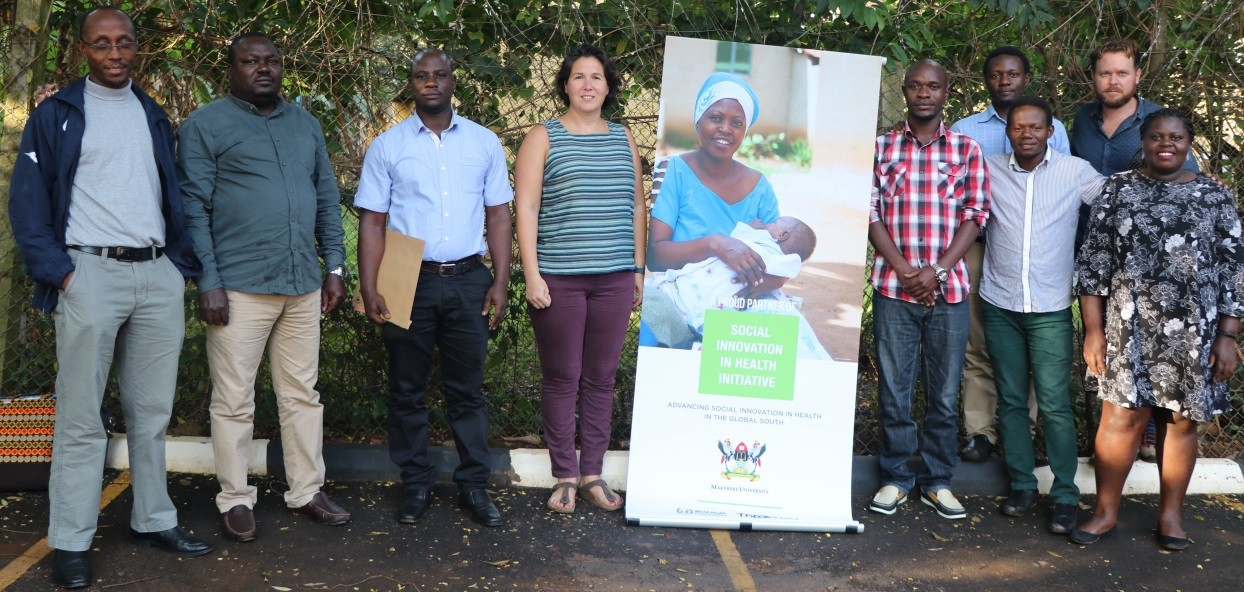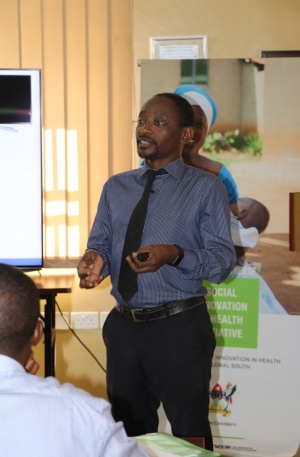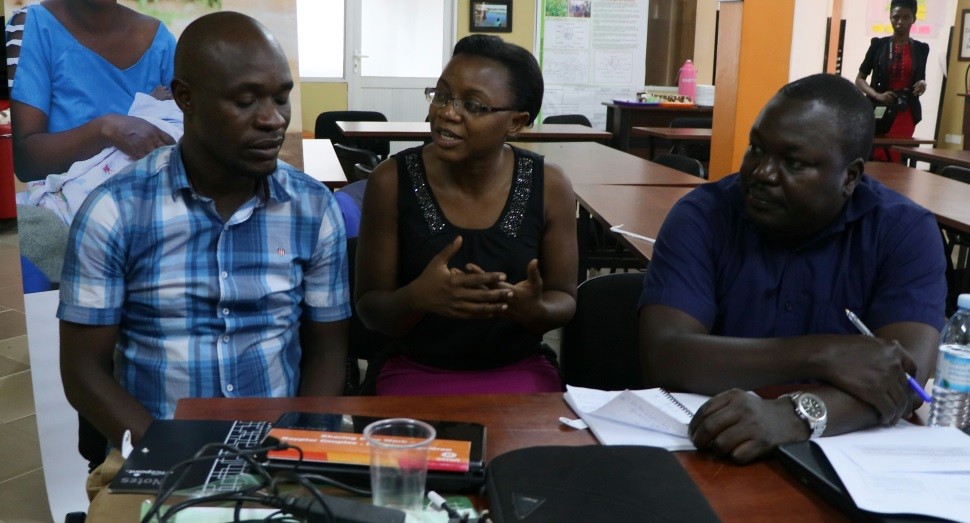
(Trainees at the SIHI Fellowship. L – R: Dr Birungi Mutahunga, Sam Lopote, Dr Julius Nkalubo, Fiona Becherlegge, Albert Odero, Renny Ssembatya, Owani, Steven Williams, Clare Kyokushaba.)
In a social innovation, you have to understand the user; and you do not stop until your innovation is superb. And then, you don’t stop!” This was revealed by Dr Roy William Mayega while addressing participants at the Social Innovation in Health Initiative (SIHI) Fellowship held at Resilient Africa Network on Tuesday 31st July 2018.
Giving an example of how SAMSUNG re – designed their products from the traditional button – phone which were growing smaller, to the big smart phones that have become commonplace now, by using research to listen to what users wanted as opposed to what producers thought users wanted, Dr Roy (pictured above) underscored the need to keep track of how the innovation is performing by constantly reviewing user needs and user feedback, and re – designing their innovations around new needs. He adjured them to be cautious of research malpractices of modifying the systems to fit the research question as opposed to the research question probing the system. He however, emphasized the need for research and/or research officers for organizations.
Dr Phyllis Awor the principal investigator of the project and also director, Social Innovation in Health hub says this training is designed to give a feel of research skills. “These are innovators who are out there innovating, improving lives, improving models and creating impact”, she says, adding that they therefore need to assess what they are doing to improve their innovations themselves, to improve the product and consequently improve the impact. She further reasoned that the training was designed to help these innovations to systematize their processes.
Referring to the brevity of the training especially in light of the technicality of the undertaking of research, Dr Phyllis (in the centre of the picture) guaranteed the continued support that the initiative offers to the innovators to see them succeed with their projects. “We continue to give them support to do their research project,” she stated.
Sam Lopote, the Action for Women and Awakening in Rural Environment (AWARE) program director, one of the trainees appreciated the impact of the training. “At least now I have learnt to draft a community – sensitive research concept to obtain information from the community. I have only been used to much - generalized research papers of name, age, number of children, etc., very simplified stuff. But now I feel I can do better than that”, he contended. He, however, decried the brevity of the training of two days, arguing that the intensity of the sessions gave him little time to internalize and “chew” through the knowledge bulk he was receiving.
SIHI is implementing phase two of its fellowship program of training social innovators in the field of health. This particular training focused on Research Methods for innovators from 5 projects implemented around the country, and selected in 2017 for being outstanding solutions to health challenges. The selected projects include:
- The Mother’s Waiting Hostel at Bwindi Community Hospital, a simple and affordable solution addressing the lack of access to skilled health care during delivery by women in remote settings in Uganda.
- Healthy Child Uganda’s MamaToto Approach; MamaToto is a district-led program which operationalizes the Village Health Team (VHT) strategy and includes health system strengthening, to promote quality maternal, new-born and child health (MNCH) practices including antenatal care (ANC), postnatal care (PNC), safe deliveries and proper sanitation in the community.
- AWARE is utilizing a holistic approach to improve the health, wellbeing and livelihood of women and girls in Karamoja through social, cultural, and economic empowerment.
- “Imaging The world Africa” is a programme which involves training identified nurses and midwives in selected lower level health facilities (HC III), to make ultrasound sweeps between specific land marks of the abdomen, to capture multiple clips that are compressed to a size of a still photo and uploaded over cell phone network to a secure system.
- Kyaninga Child Development Centre provides an innovative and holistic approach to address a wide range of challenges facing children with disabilities.
About SIHI
The SIHI is a network of passionate individuals and institutions combining their skills and resources in support of key activities, to advance social innovation in health in developing countries, with the ultimate goal of achieving sustainable development goals and improve the lives of communities in low- and middle – income countries. Launched in 2014, SIHI is spearheaded by TDR, the Special Programme for Research and Training in Tropical Diseases, hosted at the World Health Organization. In 2017, SIHI’s implementing partners extended to include the London School of Hygiene and Tropical Medicine, the University of the Philippines, the University of Malawi, Makerere University School of Public Health, the University of Cape Town and the Pan American Health Organization.



